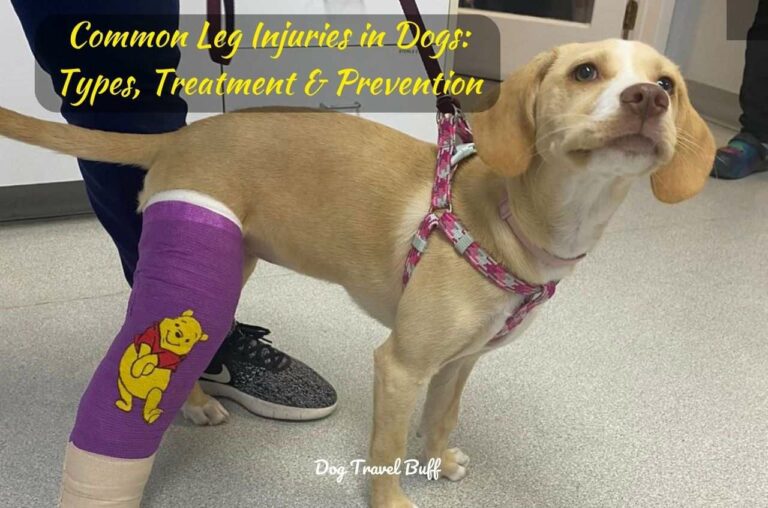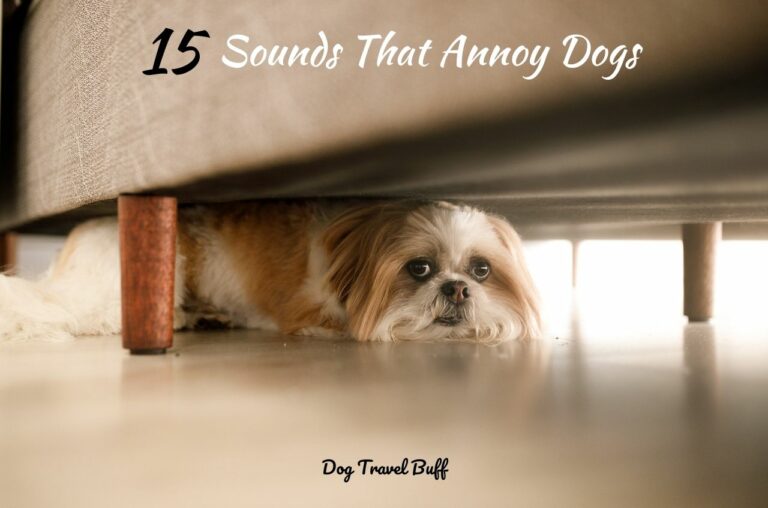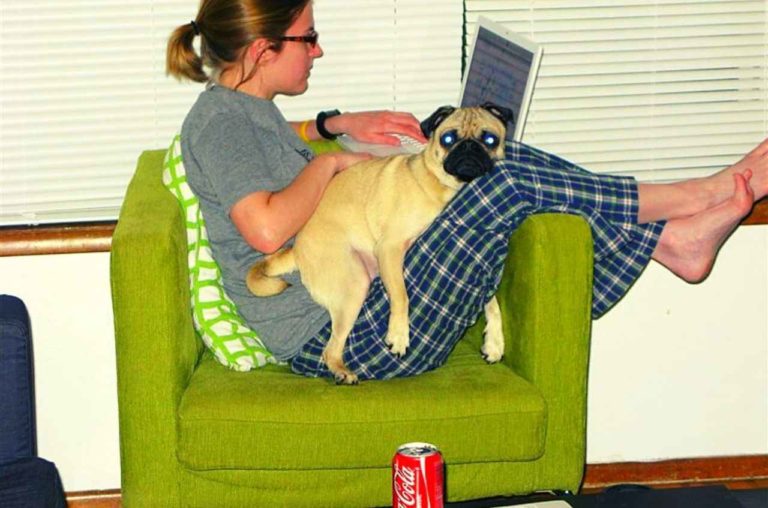11 Tips For How To Calm Down A Puppy: A Step By Step Guide
Why has my puppy started waking up in the middle of the night?
What is the thing that is bothering him?
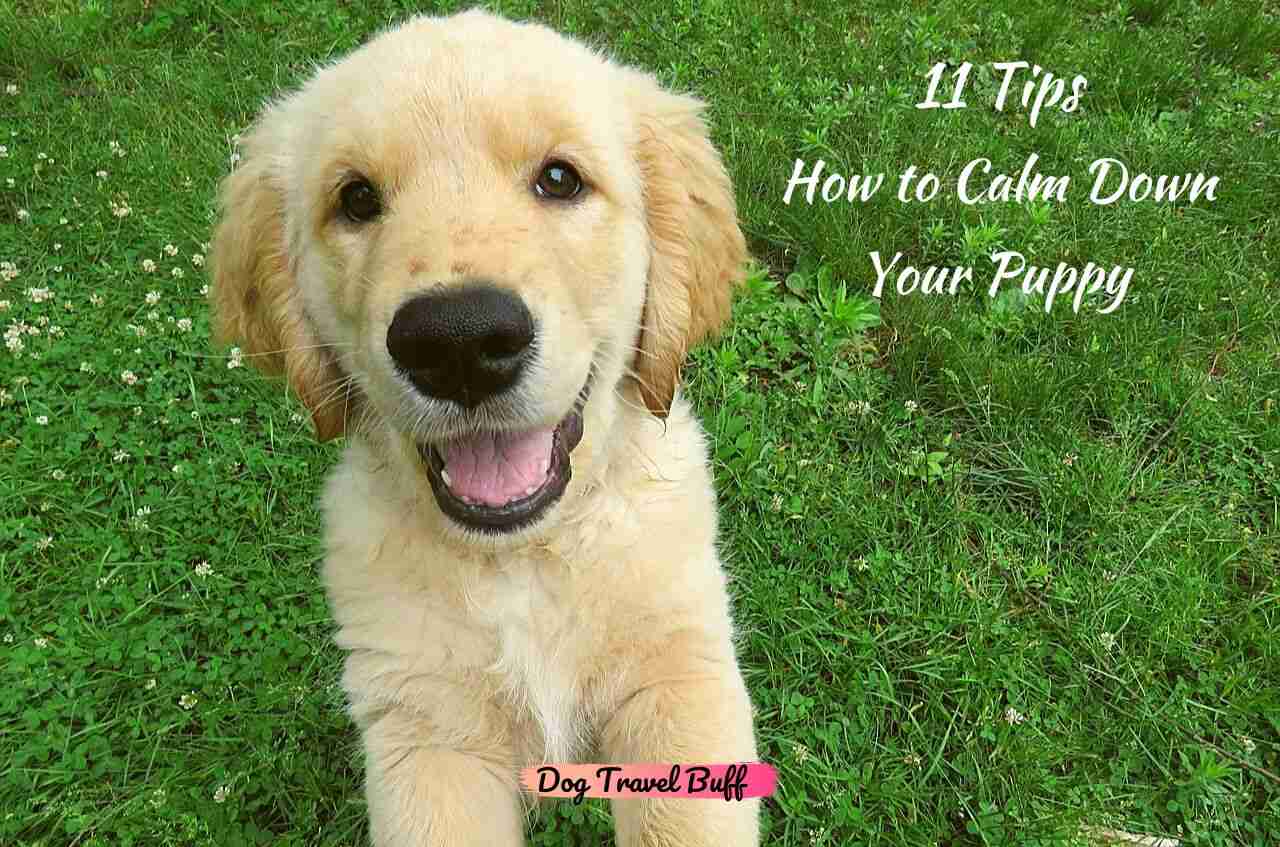
Relax, I got you.
Puppies by nature are highly energetic and active with a strong desire to play and run around.
Additionally, they are very sensitive to environmental energies.
On the other hand, frustration and anxiety can also be the reason for his restlessness.
Therefore, knowing the techniques of how to calm down a puppy can help you to soothe him.
This post may contain affiliate links. If you buy something through one of those links, you won’t pay any extra penny, but I’ll get a small commission that encourages me to deliver more helpful content for you.
Table of Contents
Why Do Puppies Become Hyper?
Puppies are gifted with a lot of energy and on top of it the new world, new love and happiness trigger them.
You will see him sitting in the corner and having food peacefully, and suddenly he is running around the house biting or scratching your carpet.
These episodes are called Frenetic Random Activity (FRAPs). Moreover, this is normal, random and nothing to worry about.
In simple terms, FRAPs are bursts of energy that they have been storing in their body the whole time. With
For example, when you return home after a long time and your puppy sees you, or he gets excited after taking a bath. All these are instances of FRAPs.
However, the good part is such “zoomies” behavior is a great stress release for pups. Do not misinterpret his frantic energy as “Obsessive Compulsive Disorder (OCD).
Additionally, you might come across a situation where your puppy cries when picked up. During such circumstances, do not squeeze your puppy; hold it gently close to you.
Remember, this is normal behavior. You do not need to worry about it. However, if the yelling continues, it is better to visit the vet-his body part might be aching.
Therefore, when it’s happening you should look into the reason for his emotional reaction and know how to calm down a puppy.
How To Calm Down A Puppy At Night?
Before calming down a scared dog, the first step is both you and your dog should be calm.
You cannot be aggressive rather hold your patience and persistence and be there for him.
This blog discusses the popular question- how to calm down a dog or a puppy?
Let’s start…
1. Show them some love
Your puppy adores you and the best way to tell him that you love him is by kisses and staying closer to him. You will notice an anxious dog climbing on your head.
Dogs cannot speak like you but understand your body language, expressions, and voice. Show them that you care and trust them.
Humans as well as dogs are not mind readers, hence use of “dog language” to communicate is important to make him feel loved.
Have you seen mothers get into a one-sided conversation with their baby who is still in the womb? Have you wondered why?
It is said that it is never too early or late to bond. The unborn child understands her mother’s connection and it only strengthens the bond and makes her close and enriched.
Whether it is a terrier or golden retriever, there is one thing every dog wants “love” from their owners.
Your emphatic affection and communication will only calm down a puppy. You can rub his ears or give small strokes with your fingers or offer a good belly rub.
Try to give them a small circular motion stroke around their cheek with affection. His wagging tail is a symbol of him calming down and relaxing.
Therefore, love language or saying “I love you” releases endorphins by stimulating the pituitary glands that help to calm down a puppy.
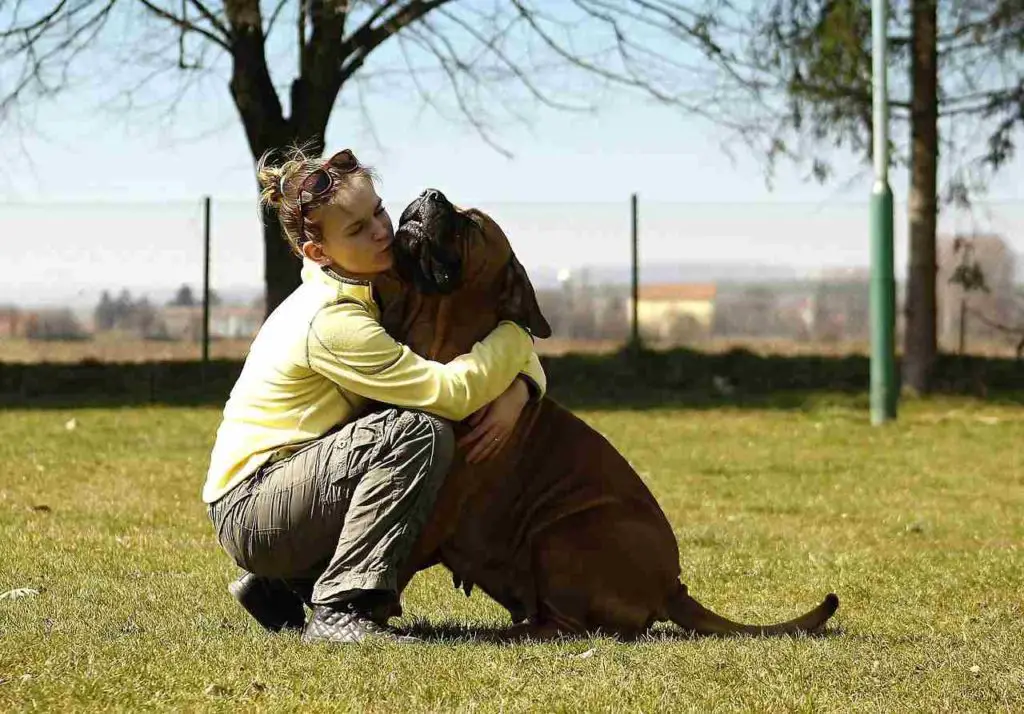
2. Play the soothing music and see the magic of the soundbox
Do you know as per an article published in Physiology & Behaviour, auditory stimulation in the form of soothing classical music reduces fear among puppies?
Devisri Sarkar, founder of The Urban Dawg and canine expert states that Gnash music with the fusion of lyrical tones with the heartbeat of the dog (around 60 to 70 beats per minute) and a soothing sound like the Tibetan Prayer wheel helps to calm the dog.
Additionally, the sound of waves crashing on the shores or the smell of lavender, vanilla, sandalwood, salty air, grass and wet soil can calm an anxious dog at night.
Dogs are very sensitive to sound and smell compared to humans. Moreover, that’s the reason dogs are used by police for detective work.
The canine friend helps police to track criminals, drugs, weapons, and other narcotics activities. So, you understand dogs are gifted with sensitive ears.
However, the sound of fireworks, thunderstorms, crackers, smoke alarms or loud hip-hop music can make them fearful and trigger their stress hormones.
You can buy calming scents or freeze-dried bully sticks that are pet friendly and help the dog to relax and burn out energy.
You can also get him a brain game to distract his mind and burn little energy. Therefore, sound, smell, and engagement are good ways to calm down a puppy.
3. Make your canine friend engage in work
According to research, 90 minutes of regular physical exercise along with consistency and patience plays a fundamental role in calming a dog.
The calm behavior of a puppy can be retained through an appropriate exercise plan as per the dog’s age and breed.
Active physical stimulation can boost the release of good endorphins that improves mobility, strength, flexibility, endurance, and body awareness.
Additionally, exercises like walking, running, and swimming also improve muscular and cardiovascular strength that boost canine healthy living behavior.
Breeds like Belgian Malinois, Border Collies, and Labrador require a lot of exercise. However, puppies like Basset Hound and Bulldog require very less.
Even nine years old puppies should engage in running, walking, and playing. You can play with him with a Frisbee or a small ball.
I can tell you that you won’t find it difficult because puppies are naturally energetic and boisterous. You definitely want his energy to be worn out in productive things.
Walking your dog thrice a week helps in binding and interacting better and eases loneliness, stress, and depression.
Therefore, if you ever see a dog chewing, jumping, or biting, know that he cannot burn out his energy. Such behavior is the behavior of excitement and anxiousness.
4. Incorporate effective obedience training
Obedience training reinforces positive etiquette and manners that help in building bonds, trust and mutual respect between each other.
Do you remember you used to get candy from your parents after getting an “A” on your report card? That made you work hard even more to get bigger gifts next time.
Dogs are like little kids; they care about praises, love, and food from their owners. Obedience training includes treats, love, and toys that the dog finds encouraging.
You have to understand that dogs do not come with pre-programmed codes. It’s your duty to restore him with impulse behavior control.
Words like “quiet”, “look”, “down”, “stay”, “give”, “drop”, “leave it”, “go”, and more are phrases that control his impulsive behavior.
If he is under voice control then there is a higher chance he will listen to you in every circumstance.
In simple terms, if you want your dog to be obedient then you should focus on consistent training.
The inclusion of aversive and reward-based training helps in developing a loveable smart relationship that can calm down a puppy in a crate.
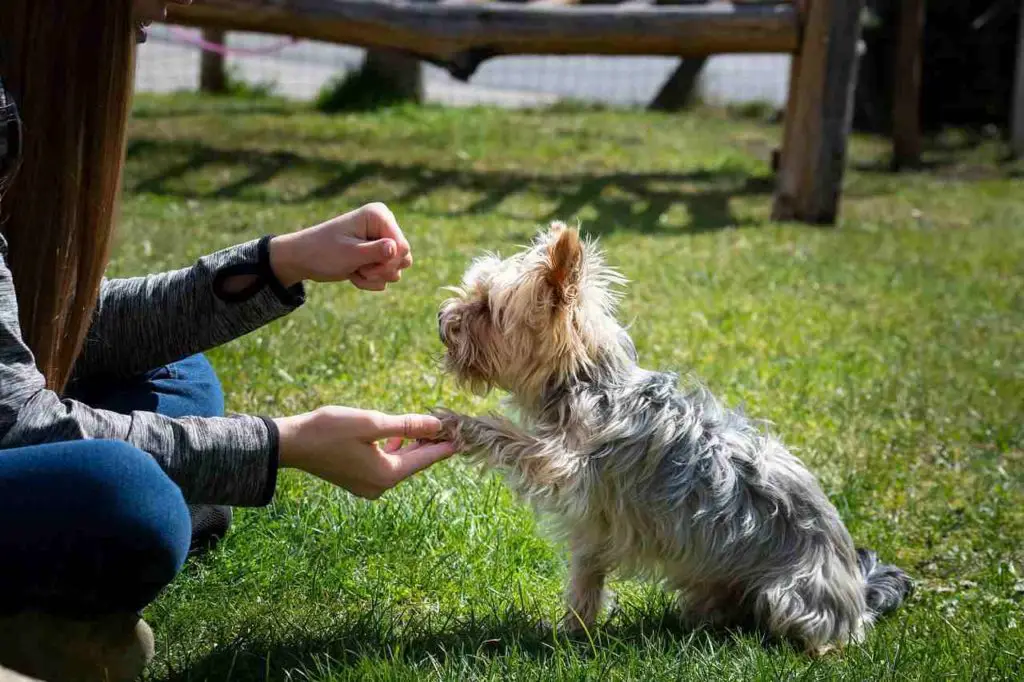
5. A good cozy place to sleep near you
Just like you feel safe in your home bed, a designated dog bed makes him comfortable and safe. Just imagine how you would feel without private space.
Every dog needs “lonely time”, and his bed offers him that place. If he does not get a cozy place he will scratch your bed sheet and furniture and make your carpet dirty.
Moreover, if he does not have his own bed he will sleep in your bed, cushion or places you don’t want him to sleep.
You can get a memory foam dog bed that is cozy and makes him secure, enclosed and comfortable.
Have ever encountered puppies crying at night, the primary reason is separation anxiety. At midnight, you will find him hopping into your bed from his crate and whining.
Your dog badly wants to stay beside you and wants to sleep within their line of sight. Hence, you can keep his bed close to your bed.
Therefore, a separate bed and bed near you are the ways to calm down an excited puppy.
If your puppy has been accidentally overfed, they may experience discomfort and restlessness. To calm them down, give them some quiet time to digest their food and allow them to rest. A gentle walk or play session can also help settle their stomach, but it’s important to monitor their behavior and limit their food intake until they have fully recovered.
Related Post: Why Does My Dog Stare at Me While I’m Sleeping?
How to Calm a Puppy Down from Biting?
Imagine those 28 tiny sharp razors like teeth going into your soft skin, Ouch! The very thought hurts, right?
Why does my puppy bite me? However, being a pet parent I know that this is painful but it is a common behavior.
Therefore, it’s important for you to teach him that biting hurts.
Here are the ways to calm a puppy down from biting.
1. Training and socialization with other dogs
Was it easy for you to make new friends in your new surroundings? Meeting new people is easy but getting accustomed to them within a short period is tough.
You have to understand that it’s similar to dogs. Dogs from a young age need to interact with people and other species to get adopted in such situations.
However, if you do not socialize with your dog the common behavior which you will notice is – barking and growling every time he sees a new person.
With proper training and socialization experience, your lovely four-legged friend would be more active and less aggressive.
The interaction will help them to know that the level of biting and nipping is tolerable and that excess can result in “no rewards”.
Positive training with socialization helps you to take your dog into a civilized society. However, an aggressive puppy is not welcomed anywhere.
Therefore, early age socialization from the age of six months can help him to calm down and stop biting.
2. Simply reward him for his calmness
Rewarding can calm down a hyper puppy and stop him from biting and nipping. However, rewarding can be in different ways- reward with attention or reward with gifts and foods.
The motto is to ignore anxious and biting behavior and reward calm behavior. For example, simply sitting without barking can be the first criterion for reward.
Slowly, you can increase the reward for his peaceful behavior. However, do not expect to see results within a day.
Moreover, it is part of obedience training. Therefore, reward him with chew toys or wholesome DHA Omega-3-made food for his calm body language and expression.
3. Do not do anything that makes him excited before sleep
Puppies with their boundless energy, curiosity and desire are always in play mode. Hence, an excited tone or a game approach from you is enough to make him excited and hyped–up.
This is ideal and certainly good for puppies to be energetic and active. However, make sure your puppy is exhausting his energy in the morning and not pulling up at night.
Excitement results in biting, humping, and playing around the room. Before going to bed, do not give them any toys, or invoke emotions that excite them.
This way, you can signal your puppies to get to bed and stop being excited.
4. Start developing a routine and reduce newness in everyday life
The moment you get your pup in your home, you shower them with affection, treats and ways you play with them.
All these are structures and patterns you develop for him to get adjusted to the new environment and behave properly in the house.
However, what happens without rules and routines? Everything falls out of place and becomes chaotic. Disorder routine will result in excessive barking, and biting.
In order to develop a good bond and relationship, you must ensure that your dog is consistent in learning and follows a routine.
For example, puppies have meals three times a day; therefore, feed them only during breakfast, lunch, and dinner. That’s the schedule!
On the other hand, consistent potty breaks, sleep routines, and playtime will result in less confusion and unfair treatment towards him.

5. Use the bathroom right before bed
Just before going to bed, a trip to the bathroom is crucial for preventing midnight breaks. However, if he is younger he needs to go outside at night multiple times.
For example, a two-month-old puppy will need a bathroom break every two hours compared to a four-year-old puppy.
In order to prevent panicking dogs, make sure to have a routine and take them out to use the bathroom before going to sleep.
A routine makes him more consistent with his habits and makes him healthy. It also does not make him tired.
6. Natural remedies and medicines
Natural supplements like Casein and L-tryptophan help in relaxing. However, these should not be given without a doctor’s permission.
Drugs like Clonidine, Trazodone, Alprazolam, and Gabapentin are the commonly prescribed medicines that reduce hyper-ness among dogs.
Conclusion
These tips on how to calm down a puppy will help you to have a clear image to make him feel at home. I will emphasize more the creation of a safe environment, not a prison that affects his mental health. Therefore, these steps will protect your pup from scary situations and usher him into the love he deserves. Moreover, do not hesitate to seek professional help for better guidance.
Read Next:
- 14 Reasons Why Your Dog Keeps Licking Base of His Tail?
- 9 Reasons Why Does My Dog Hump After Eating
- 22 Reasons Why Is My Senior Dog Panting At Night Excessively
- How To Potty Train A Yorkie Puppy In 2 Days
FAQ – How to Calm Down a Puppy
1. At what age do puppies start to calm down?
A: Remember, age is just a number, his personality and breed influence his calming nature. Still, puppies from the age of 6 months with proper training start getting mature and develop a calming attitude.
2. Does punishing a puppy work?
A: No, punishing a puppy never works and it can only lead to aggressive behavior and a lot more barking. Rather, reward him for good behavior and stop rewarding him for not following your instructions.
3. Do puppies get calmer as they get older?
A: With proper training and reinforcement behavior, the personality of puppies changes with time.
4. How to calm a dog in the car?
A: Hold him close to you, open the windows and turn on the music sung by Bob Marley. As per the research by the Scottish SPCA, soft rock, Reggae or classical music has the ability to soothe dogs’ minds.


